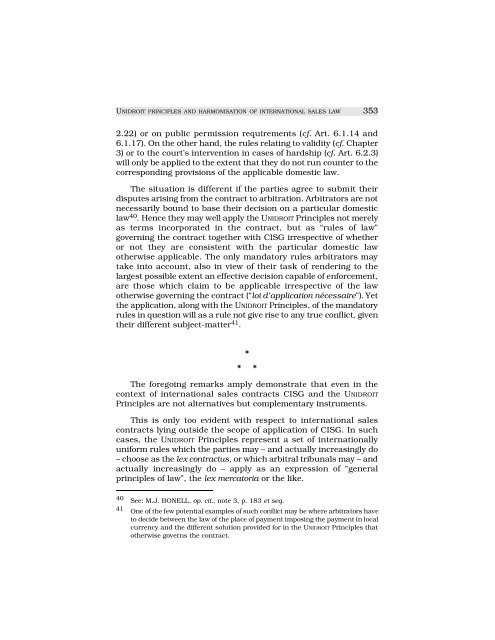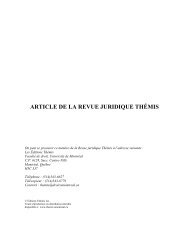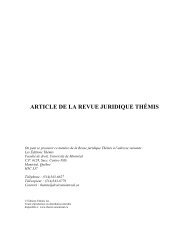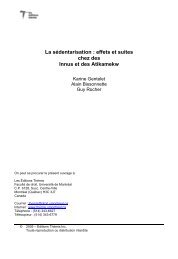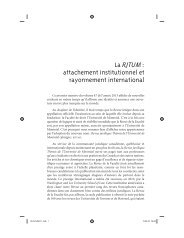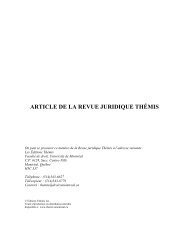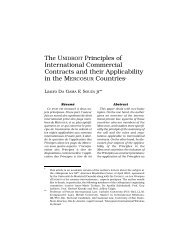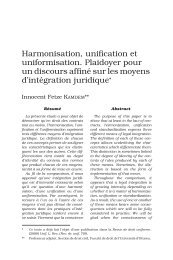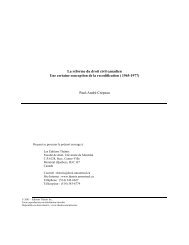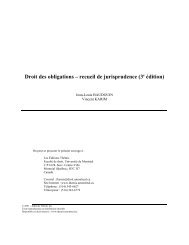The UNIDROIT Principles of International Commercial Contracts and ...
The UNIDROIT Principles of International Commercial Contracts and ...
The UNIDROIT Principles of International Commercial Contracts and ...
Create successful ePaper yourself
Turn your PDF publications into a flip-book with our unique Google optimized e-Paper software.
<strong>UNIDROIT</strong> PRINCIPLES AND HARMONISATION OF INTERNATIONAL SALES LAW 353<br />
2.22) or on public permission re q u i rements (c f . Art. 6.1.14 <strong>and</strong><br />
6.1.17). On the other h<strong>and</strong>, the rules relating to validity (c f. Chapter<br />
3) or to the court’s intervention in cases <strong>of</strong> hardship (cf. Art. 6.2.3)<br />
will only be applied to the extent that they do not run counter to the<br />
corresponding provisions <strong>of</strong> the applicable domestic law.<br />
<strong>The</strong> situation is diff e rent if the parties agree to submit their<br />
disputes arising from the contract to arbitration. Arbitrators are not<br />
necessarily bound to base their decision on a particular domestic<br />
l a w 4 0 . Hence they may well apply the UN I D R O I T <strong>Principles</strong> not mere l y<br />
as terms incorporated in the contract, but as “rules <strong>of</strong> law”<br />
governing the contract together with CISG irrespective <strong>of</strong> whether<br />
or not they are consistent with the particular domestic law<br />
otherwise applicable. <strong>The</strong> only m<strong>and</strong>atory rules arbitrators may<br />
take into account, also in view <strong>of</strong> their task <strong>of</strong> rendering to the<br />
l a rgest possible extent an effective decision capable <strong>of</strong> enforc e m e n t ,<br />
a re those which claim to be applicable irrespective <strong>of</strong> the law<br />
otherwise governing the contract (“loi d’application nécessaire”). Yet<br />
the application, along with the UN I D R O I T <strong>Principles</strong>, <strong>of</strong> the m<strong>and</strong>atory<br />
rules in question will as a rule not give rise to any true conflict, given<br />
their different subject-matter 41 .<br />
*<br />
* *<br />
<strong>The</strong> foregoing remarks amply demonstrate that even in the<br />
context <strong>of</strong> international sales contracts CISG <strong>and</strong> the UN I D R O I T<br />
<strong>Principles</strong> are not alternatives but complementary instruments.<br />
This is only too evident with respect to international sales<br />
contracts lying outside the scope <strong>of</strong> application <strong>of</strong> CISG. In such<br />
cases, the UN I D R O I T <strong>Principles</strong> re p resent a set <strong>of</strong> intern a t i o n a l l y<br />
uniform rules which the parties may – <strong>and</strong> actually increasingly do<br />
– choose as the lex contractus, or which arbitral tribunals may – <strong>and</strong><br />
actually increasingly do – apply as an expression <strong>of</strong> “general<br />
principles <strong>of</strong> law”, the lex mercatoria or the like.<br />
40 See: M.J. BONELL, op. cit., note 3, p. 183 et seq.<br />
41 One <strong>of</strong> the few potential examples <strong>of</strong> such conflict may be where arbitrators have<br />
to decide between the law <strong>of</strong> the place <strong>of</strong> payment imposing the payment in local<br />
currency <strong>and</strong> the different solution provided for in the <strong>UNIDROIT</strong> <strong>Principles</strong> that<br />
otherwise governs the contract.


